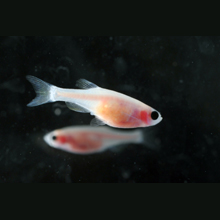Addicted Fish?
How useful are animal models in understanding the molecular and cellular mechanisms that underlie addiction?
|
As a warmup for the Royal Society Summer Science Exhibition we have invited one of the teams from the event to tell us about their work.
Dr Matt Parker of Queen Mary, University of London will talk about how studying the impulsive nature of zebrafish can tell us about the cycle of addiction, specifically, the move from occasional drug use to habitual and compulsive drug seeking, withdrawal and relapse. Dr Parker will discuss some of the difficulties associated with treatment, and how understanding more about the genetics and early markers of addiction may help to develop more effective treatments and even prophylactic interventions. |

|
Date: Wednesday 26th June 2013
Time: 7pm, for a 7.30pm start
Place: Upstairs at The Lamb, 92 Lambs Conduit Street, WC1N 3LZ [gmap]
Cost: Free
You can learn more about the Zebrafish Neurobiology and Behavioural Genetics Group’s work and their exhibit at http://zebrafish-genetics.tumblr.com/
3 Responses to “Addicted Fish?”
-
Katie Cichowski Says:
July 17th, 2013 at 1:35 amWish I could have been there to hear this talk. I’m in early recovery for a gambling addiction and I think that knowing why some people are more susceptible to addiction than others would help enourmously in my road to recovery. Keep up the good work.
Katie
-
Is the Secret to Curing Addiction in an Aquarium? Says:
July 17th, 2013 at 8:12 am[…] when I heard that Science London was putting on a talk called ” Addicted Fish: How useful are animal models in understanding the molecular and cellular mechanisms that underlie […]
-
Answers to addiction sought in the aquarium | Later On Says:
July 25th, 2013 at 1:41 am[…] when I heard that Science London was putting on a talk called “Addicted Fish: How useful are animal models in understanding the molecular and cellular mechanisms that underlie […]
Leave a Reply
This site is powered by WordPress.
Science London was part of the British Science Association
